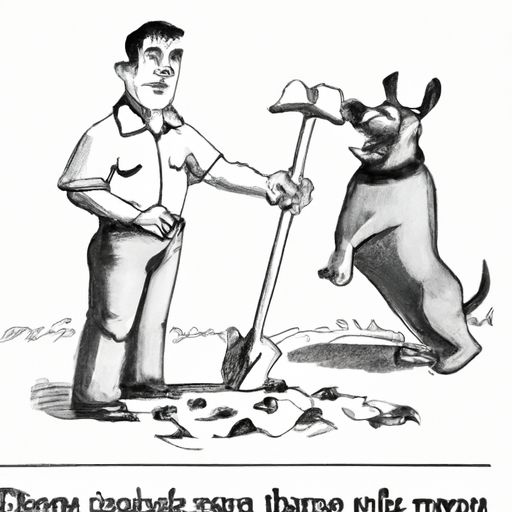If you’ve ever found yourself asking why your dog keeps turning your backyard into a miniature Grand Canyon, you’re not alone. Many dog owners are faced with this challenge, and while it can be frustrating, it’s important to understand that digging is a natural canine behavior. However, excessive digging can sometimes be a sign of boredom, anxiety, or other issues. Let’s delve into the world of dogs and their digging habits, and explore strategies to keep our furry friends from turning our yards into a moonscape.
Table of Contents
1. Understanding Why Dogs Dig
2. Ways to Prevent Digging
3. Creating a Dog-Friendly Yard
4. Frequently Asked Questions
Key Takeaways
– Digging is a natural canine behavior, often rooted in instinct.
– While some digging is normal, excessive digging can be a sign of boredom, anxiety, or other issues.
– There are several strategies to discourage digging, from providing alternative activities to creating a dog-friendly yard.
Understanding Why Dogs Dig
First and foremost, it’s crucial to understand why dogs dig. Digging can serve various purposes for dogs, from hunting and hiding food to seeking comfort and protection. Some breeds, like terriers and dachshunds, are genetically predisposed to digging because their ancestors were bred for jobs that involved burrowing.
However, excessive or destructive digging is often a sign of underlying issues. The American Kennel Club explains that dogs may dig out of boredom, to escape confinement, or as a result of separation anxiety. Understanding the root cause of your dog’s digging is the first step in addressing the issue.
Ways to Prevent Digging
There are several strategies to deal with a dog that digs. Here are a few you might find helpful:
-
Provide Plenty of Exercise: A tired dog is a good dog. Make sure your dog is getting plenty of physical and mental stimulation every day. This could include walks, playtime, or even dog sports.
-
Offer Alternatives: If your dog is digging out of boredom, provide them with alternative activities. This could include toys, puzzle feeders, or even a digging box filled with sand or dirt where they can dig to their heart’s content without ruining your yard.
-
Create a Dog-Friendly Yard: If your dog is digging to escape, consider making your yard more dog-friendly. More on this in the next section.
-
Address Separation Anxiety: If your dog digs because of anxiety, consider working with a professional dog trainer or behaviorist. You can find more tips on dealing with separation anxiety here.
Creating a Dog-Friendly Yard
Creating a dog-friendly yard can go a long way in preventing destructive digging. This could involve adding a dog house for shelter, installing a fence to prevent escape attempts, and providing plenty of dog-friendly toys and activities.
Consider adding features like a sandbox for digging or a kiddie pool for cooling off. You can also plant dog-friendly plants and grasses that are resistant to digging. The ASPCA has a comprehensive list of safe plants for dogs.
Frequently Asked Questions
Q: Is it okay for my dog to dig?
A: Yes, digging is a natural canine behavior. However, if your dog’s digging becomes destructive or excessive, it may be a sign of underlying issues such as boredom or anxiety.
Q: What breeds are most likely to dig?
A: Terriers and dachshunds are known for their digging habits, as their ancestors were bred for burrowing and hunting. However, any dog can develop a habit of digging.
Q: How can I prevent my dog from digging up my yard?
A: Providing plenty of physical and mental stimulation, offering alternatives to digging, and creating a dog-friendly yard are all effective strategies to discourage digging.
With a bit of knowledge and patience, it’s possible to manage your dog’s digging habits while still allowing them to express their natural canine behaviors. The key is understanding why your dog digs and providing them with appropriate outlets for their energy and instincts.



